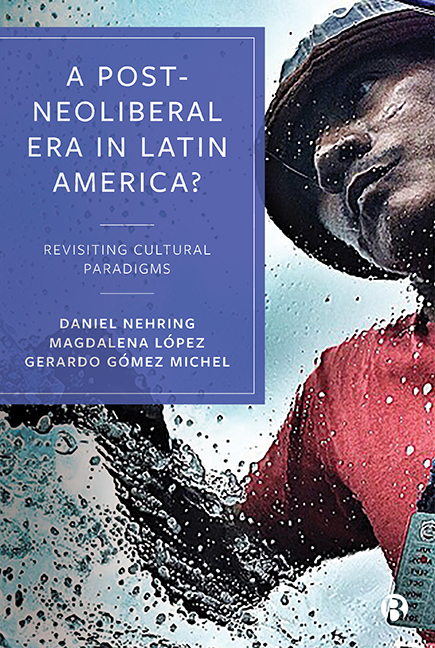Book contents
- Frontmatter
- Contents
- List of Tables and Figures
- Notes on Contributors
- 1 Introduction: Everyday Life in (Post-)Neoliberal Latin America
- 2 Imaginaries, Sociability and Cultural Patterns in the Post-Neoliberal Era: A Glance at the Argentinean, Paraguayan, and Venezuelan Experiences
- 3 Making Neoliberal Selves: Popular Psychology in Contemporary Mexico
- 4 From Uribe’s “Democratic Security” to Santo’s Peace Accords with the FARC: Hate, Fear, Hope and other Emotions in Contemporary Colombian Politics
- 5 Cine Bajo Tierra: Ecuador’s Booming Underground Cinema in the Aftermath of the Neoliberal Era
- 6 Neoliberalising Humanity: Culture and Popular Participation in the Case of the Street Market of Caruaru, Brazil
- 7 The Contribution of the Catholic Magazine Espacio Laical and the Constitution to the Cuban Public Sphere
- 8 Argentina: The Philosophical Resistance to the Conquest of the Soul1
- 9 Fleeing (Post-)Chávez Memories: The 1990s and the Black Friday Generation
- 10 Re-imagined Community: The Mapuche Nation in Neoliberal Chile
- 11 Neoliberalism and the Negotiation of the American Dream in Contemporary Latina Narratives
- 12 Bare Life in Contemporary Mexico: Everyday Violence and Folk Saints
- Index
12 - Bare Life in Contemporary Mexico: Everyday Violence and Folk Saints
Published online by Cambridge University Press: 20 April 2022
- Frontmatter
- Contents
- List of Tables and Figures
- Notes on Contributors
- 1 Introduction: Everyday Life in (Post-)Neoliberal Latin America
- 2 Imaginaries, Sociability and Cultural Patterns in the Post-Neoliberal Era: A Glance at the Argentinean, Paraguayan, and Venezuelan Experiences
- 3 Making Neoliberal Selves: Popular Psychology in Contemporary Mexico
- 4 From Uribe’s “Democratic Security” to Santo’s Peace Accords with the FARC: Hate, Fear, Hope and other Emotions in Contemporary Colombian Politics
- 5 Cine Bajo Tierra: Ecuador’s Booming Underground Cinema in the Aftermath of the Neoliberal Era
- 6 Neoliberalising Humanity: Culture and Popular Participation in the Case of the Street Market of Caruaru, Brazil
- 7 The Contribution of the Catholic Magazine Espacio Laical and the Constitution to the Cuban Public Sphere
- 8 Argentina: The Philosophical Resistance to the Conquest of the Soul1
- 9 Fleeing (Post-)Chávez Memories: The 1990s and the Black Friday Generation
- 10 Re-imagined Community: The Mapuche Nation in Neoliberal Chile
- 11 Neoliberalism and the Negotiation of the American Dream in Contemporary Latina Narratives
- 12 Bare Life in Contemporary Mexico: Everyday Violence and Folk Saints
- Index
Summary
Necropolitics and homo sacer
The postcolonial critic Achille Mbembe offers “necropolitics” as a corrective complement to Michel Foucault's broadly known idea of “biopolitics.” Foucault underlines that modern liberal governments have moved away from controlling the population through the imminent threat of death to use subtler disciplinary techniques to achieve the (un)conscious subjugation of the subject and its body. The validity of the influence of bio-power rests with the constant reproduction of living subjects. However, Mbembe points out that biopolitics is not sufficient for explaining how the work of death continues to prevail as a technique of governance in the contemporary politics and everyday life. His arguments lie in that the sovereign, whose role is to defend society from potential threats, is still given the power to determine who may live and who must die. Thus, the relationship between politics and death is essential to understanding “how the state has emerged through its reproduction of death and to examine consequent transformations in the meaning and representation of death in everyday life for its citizens” (Mbembe, 2003, p.16).
To demonstrate the presence of necro-power, Mbembe, unlike Foucault's reliance on Western European cases, draws examples from the more politically volatile state of peripheral regions and countries. For instance, in many African states, the political economy of statehood has changed drastically over the past few decades. Governments have failed to maintain the economic underpinning for political authority and order, and in turn have been forced to forfeit their monopoly on violence and control over death. Therefore, “other armed forces such as urban military, armies of regional lords and private armies all claim the right to exercise violence to kill” (Mbembe, 2003, p.26). These armed powers share a complicated relationship with the state, at times usurping control and undermining state power and at others allying with it to eliminate competing armed groups. Rather than writing this situation off as a simple “failure of the state,” Mbembe claims that this is a form of war in which survival of the fittest governs any and all human action, leading to an incessant chain of violence and terror.
- Type
- Chapter
- Information
- A Post-Neoliberal Era in Latin America?Revisiting Cultural Paradigms, pp. 243 - 260Publisher: Bristol University PressPrint publication year: 2019



